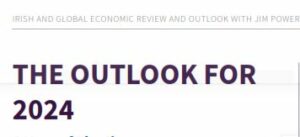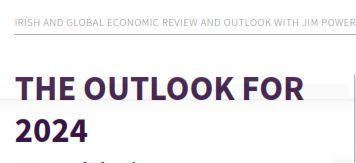
In this month’s issue we enclose Aviva’s Investment outlook for 2024
THE OUTLOOK FOR 2024
A Year of Election
2024 is set to be dominated by political events, with 76 states around the world due to have elections. Political events tend to have significant economic consequences, so much of the focus on economics will be dominated by politics.
The election in Taiwan in January is first up. From a global geopolitical perspective, the relationship between China and the United States will be the defining one over the coming decades, just as the relationship between the US and the USSR was up to1990. Strategically, Taiwan is the most dangerous and immediate challenge to that relationship.
There are elections to the European Parliament in June. The most interesting thing to watch in those elections will be the performance of the far-right, who are intent on destabilising the EU model.
In Ireland, the European and the local elections in the same month will be watched closely for the economic manifestos of the various parties ahead of a general election that must be held by March 2025.
The most significant election promises to be the US presidential election in November. If Donald Trump manages to make it to the starting line, there is every chance he could become the next president. Such an outcome would have significant implications for the global economic order as barriers to trade in the shape of high tariffs and even more intense economic nationalism would likely become the order of the day.
The Economic Issues
While global economics will be heavily influenced by potentially seismic political developments over the coming year, the immediate economic narrative will be dominated by the path of inflation; the growth momentum in the Euro Zone in particular; and how quickly central bankers start to loosen monetary policy.
The central scenario seems to be:
- Inflationary pressures will continue to gradually ease, but it is unlikely to be a smooth path as tight labour markets continue to pressurise services sector inflation. After strong downward momentum up to November, headline inflation rates increased to 3.7 % in Germany in December; French inflation increased to 4.1%; and Euro Zone inflation increased to 2.9 %. While some of the rebound in December was due to technical factors such as the ending of government subsidies on gas, electricity and food, and the base effect of energy prices from a year ago, it is likely to prove more challenging to push inflation back within target ranges, but this will be achieved as the year progresses. Energy prices will be important and remain vulnerable to the escalation of tensions in the Middle East. On the food front, the news is positive. The FAO Food Price Index fell to its lowest level since February 2021 in December. For 2023, average global food prices declined by 13.7 %.
- Towards the end of 2023, the markets became quite excited by the downtrend in inflation and priced in the probability that interest rate cuts would come early in the new year and be more aggressive than previously thought possible. However, this sense of euphoria has been tempered in the early days of 2024. It is likely that central bankers will adopt a more cautious approach than what the irrational markets in their enthusiasm had priced in late last year. Having fought so hard and so aggressively to bring inflation under control, the nature of most central bankers is such that greater reticence is likely. They will need to be convinced that the war is really won before moving. Against a background of very obviously weak economic performance in the Euro Zone and the UK in particular, interest rates will come down everywhere in 2024, but it may not just be as quick or as aggressively as the markets previously believed.
- Despite higher interest rates and many economic and political headwinds, labour markets everywhere remained tight in 2023. In December, the US economy added a stronger than expected increase of 216,000 in non-farm employment, and the unemployment rate remained at a low 3.7 per cent of the labour force. The tightness of labour markets and the potential for wage-driven inflation will be watched closely be central bankers.
- Economic activity in the Euro Area and the UK will continue to bounce along the bottom, and the US will perform somewhat better. China will recover somewhat on the back of strong public intervention.
For Ireland, the momentum in the economy is reasonably solid as we move into 2024. Several pertinent issues stand out for 2024:
- The performance of the multi-national export sector and corporation tax receipts will have to be watched carefully.
For indigenous business, 2024 will likely be a more challenging year due to government measures and other cost pressures. The Revenue debt warehousing scheme introduced during Covid is due to be unwound from April onwards. The 12 per cent increase in the minimum wage will add to cost pressures, but Government support announced in Budget 2024 will provide some support. Recruitment and retention of labour will remain a significant business challenge.
- For the personal sector, notwithstanding the challenges posed by the escalation in the cost of living over the past two years and the sharp increase in interest rates, consumer fundamentals are quite positive. Budget 2024 measures are being implemented from January 1st; household savings are at a record high and debt levels are well contained; the labour market remains very strong; and incomes will grow quite strongly in 2024. A deceleration in inflation and the prospect of ECB rate cuts later in the year will also help.
- Despite the progress that is being made in terms of housing supply, the cost and availability of housing for ownership and rental purposes remains the most significant and urgent economic and social challenge facing the country
- Politics, however, will take centre stage in 2024 the economic policy platform of all parties will be highlighted over the coming months.
All in all, 2024 should see a reasonable level of activity in the economy, but some easing from the strong growth of the past three years looks inevitable. Economically and politically, Ireland remains in a better and more stable position than many other countries now. However, the external risks and challenges are very real.
Should you wish to discuss any of the above or need any further information or advice, please do not hesitate to contact a member of our advisory team at Jim@hegarty.ie, Niamh@hegarty.ie, Frank@hegarty.ie & Ross@hegarty.ie or alternatively you can call the office directly on 01 4972544.
Hegarty Financial Management 40 years caring for our clients financial wellbeing.



